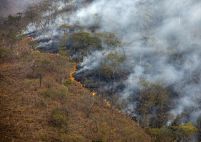Key messages

- ©Brent Stirton/Getty Images for FAO
Forests are a vital source of food and nutrition.
Nearly one billion people globally depend on harvesting wild food such as herbs, fruits, nuts, meat and insects for nutritious diets. In some remote tropical areas, the consumption of wild meat is estimated to cover between 60 - 80 percent of daily protein needs.

- ©FAO/Luis Tato
Forests are natural pharmacies.
Around 50 000 plant species – many of which grow in forests – have medicinal value. Local communities use forest-derived medicines for a wide array of ailments and many common pharmaceutical medicines are derived from forest plants, including cancer-treating drugs from the Madagascar periwinkle and malaria medication quinine from cinchona trees.

- ©Brent Stirton/Getty Images FAO
Healthy forests protect us from diseases.
Forests have traditionally served as a natural barrier to disease transmission between animals and humans, but as deforestation continues, the risk of diseases spilling over from animals to people is rising. More than 30 percent of new diseases reported since 1960 are attributed to land-use change, including deforestation.

- ©FAO/Klienne Eco
Forests boost our mental and physical health.
Spending time in forests increases positive emotions and decreases stress, blood pressure, depression, fatigue, anxiety and tension. Trees in cities also absorb pollutant gases from traffic and industry and filter fine particulates such as dust, dirt and smoke, which help shield urban populations from respiratory diseases.

- ©FAO/Fabio Lopes
Forests play a central role in combating the biggest health threat facing humanity: climate change.
Healthy forests help keep global warming in check: forests contain 662 billion tonnes of carbon, which is more than half the global carbon stock in soils and vegetation. Forests and trees also help buffer exposure to heat and extreme weather events caused by climate change, which pose a major global health challenge. For example, trees properly placed around buildings cool the air and can cut air conditioning needs by up to 30 percent, also saving energy.

- © FAO/Luis Tato
Forests are under threat and need our help.
Ten million hectares – roughly the equivalent of 14 million football pitches – of forest were lost per year to deforestation between 2015 and 2020. Forest insects damage around 35 million hectares of forest annually. Fire affected approximately 98 million hectares of forest globally in 2015. Through forest-friendly policies and increased investment in forests and trees we can protect our planet and our health.

